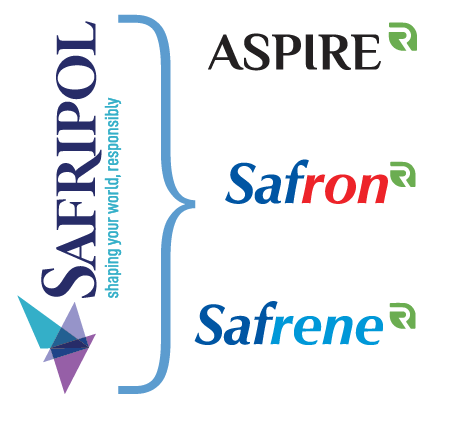‘The R&D process started during the third quarter of 2020 and required long-term partnerships with our customers, brand owners, technology partners and raw material suppliers, who are aligned to Safripol’s vision and sustainability goals, to bring ASPIRE to commercialisation stage in mid-March,’ reports technology and innovation executive Gert Claasen. ‘These multi-stakeholder partnerships across the value chain and innovation ecosystem are key to unlocking sustainable fit-for-purpose solutions for our local market.’
‘ASPIRE 15 and ASPIRE 25 are the first two products of Safripol’s recycled polymer portfolio, based on a one-bag solution containing 15% and 25% rPET post-consumer resin respectively that will be supplied to the South African plastics converting industry,’ he explains. ‘Safripol is also actively developing two additional product solutions for its recycled polyolefins product range which have been trademarked and registered as Safron for rPP and Safrene for HDPE.’
The development of Safripol’s recycled polymer portfolio is aligned with the government’s Extended Producer Responsibility (EPR) legislation, which is now in its second year of implementation, Gert adds. ‘ASPIRE supports the plastic circular economy and is essentially produced from the bottle-to-bottle recycling value chain. This one-bag rPET offering allows converters to comply with the EPR requirements of 12.5% recycled content inclusion for PET beverage bottles and also meet their organisations’ sustainability targets,’ he maintains.

In alignment with 2025 sustainability goals
Safripol views ASPIRE as a game-changer for South African plastic recycling, impacting the entire value chain and bringing the local polymer producer closer to achieving its three major 2025 sustainability goals. The first is enhancing the circular economy by advancing recycling, design for circularity and mobilising waste collections.
The second goal includes reducing its environmental impact through transitioning to a lower carbon economy, producing renewable feedstocks as well as reducing greenhouse gas emissions, energy and water usage and waste generated.
The final goal is making a positive social impact in communities via Safripol ambassadors who facilitate community recycling projects, access to quality education, skills and training, as well as enterprise development.
‘ASPIRE will help increase the awareness of the value of plastic waste and help with the drive for greater recycling rates by making it more obvious to consumers that PET waste has a real value, encouraging greater efforts to recycle,’ Gert maintains. ‘This will result in more plastic waste material for reclaimers, buy-back centres collecting and processing more PET and manufacturers creating more products using recycled material. PET bottles and packaging don’t belong in our environment. They belong back where they started, as raw materials to be used in the circular value chain.’









